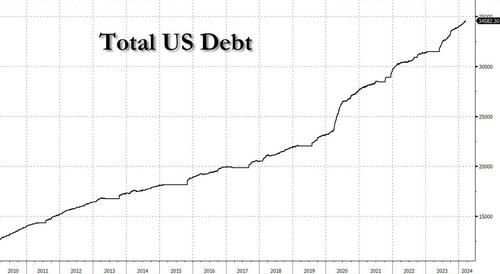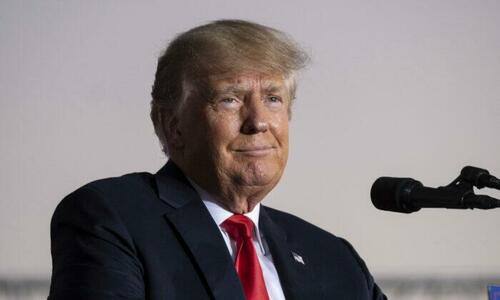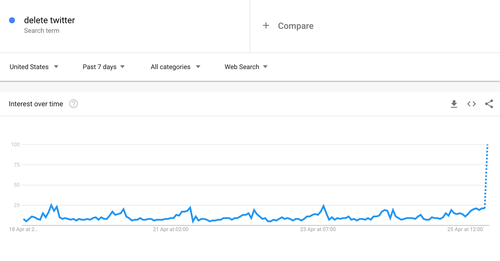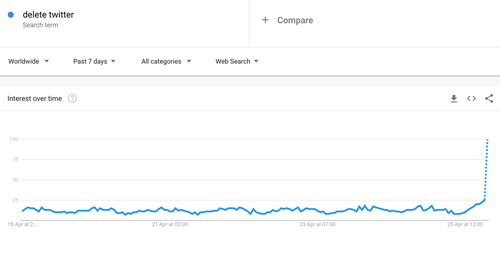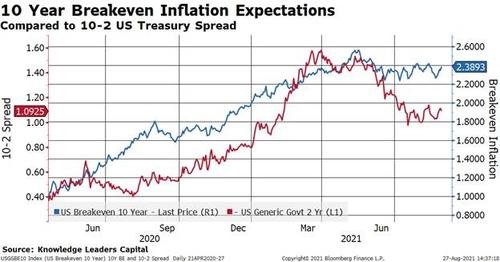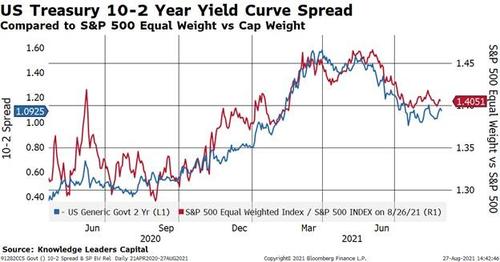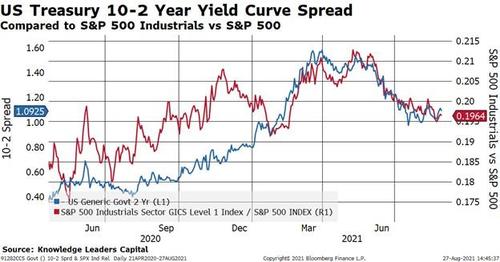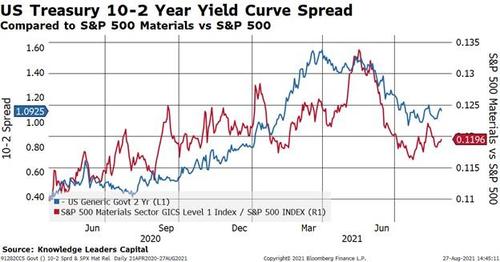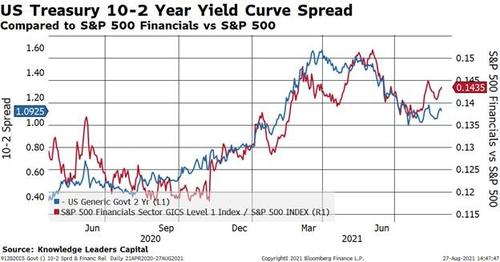Futures Slide After Disappointing JPMorgan Earnings, Tech Rout Worsens
After trading flat for much of the overnight session, S&P futures slumped to session lows shortly after JPM reported earnings that disappointed the market (see our full write up here) and were last trading down 30 points or 0.64%, with Dow futures down 0.3% and Nasdaq futures taking on even more water as the "sell tech" trade was back with a bang. Treasury yields rose 3bps to 1.74% and the dollar reversed an overnight loss. The VIX jumped above 20 and was last seen around 21.
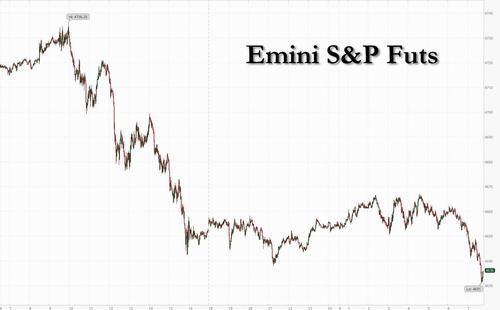
The Nasdaq 100 fell to the lowest in almost three months yesterday as tech came under pressure after Fed Governor Lael Brainard said officials could boost rates as early as March. It looks like the selling will continue today.
“Market sentiment has been shaken by concerns over the prospect of imminent Fed tightening along with record global Covid-19 infection rates, but we don’t expect either of these factors to end the equity rally,” said UBS Wealth Management CIO Mark Haefele in a note. “The fourth-quarter U.S. earnings season, which started this week, could turn investor attention back to strong fundamentals.”
JPMorgan shares dropped in premarket trading after revenues and EPS beat thanks to a $1.8 billion reserve release while FICC trading revenue missed expectations even as its dealmakers posted their best quarter ever and Chief Executive Officer Jamie Dimon gave an upbeat assessment of prospects for growth. Wells Fargo advanced after reporting higher-than-estimated revenue. BlackRock Inc. became the first public asset manager to hit $10 trillion in assets, propelled by a surge in fourth-quarter flows into its exchange-traded funds. Here are some of the other notable pre-movers today:
- U.S.-listed casino stocks with operations in Macau rise after the announcement of much-anticipated changes to the local casino law aimed at tightening government oversight on the world’s largest gaming market. Las Vegas Sands (LVS US) +6.6%; Melco Resorts (MLCO US) +5.5%; Wynn Resorts (WYNN US) +5.6%.
- Apple (AAPL US) shares are up in U.S. premarket trading after Piper Sandler raises its target for the stock, saying that Apple’s set-up for 2022 is favorable. Broker adds that the tech giant’s venture into health-care and automotive markets are the next catalysts to drive the stock to a $4 trillion market cap and beyond.
- NextPlay Technologies (NXTP US) shares jump 19% in U.S. premarket trading after giving an update for fiscal 3Q 2022 late yesterday.
- Domino’s Pizza (DPZ US) is cut to equal-weight from overweight at Morgan Stanley, while Chipotle is upgraded to overweight from equal-weight amid a “mixed” view on restaurant stocks into 2022.
- Amicus Therapeutics (FOLD US) advanced in postmarket trading after being upgraded to outperform from market perform at SVB Leerink, which cited the potential of a treatment for Pompe disease, should it be approved.
- Spirit Realty dropped 4% postmarket after launching a share sale via Morgan Stanley and BofA Securities.
European equities traded poorly and followed the drop in Asia, with most sectors trading lower, weighed down once again by a soft tech sector. Euro Stoxx 50 is down 0.8%, most major indexes dropped over 1% before rising off the lows. Oil & gas is the best Stoxx 600 performer with crude trading well. European technology stocks as well as pandemic winners are leading declines after a U.S. selloff in tech shares resumed Thursday as Federal Reserve officials signaled their intention to combat inflation aggressively. European chipmakers are down in early trading Friday: ASM International -3.5% at 9.17 a.m. CET, Infineon -0.9%, ASML -2.9%, STMicroelectronics -2.3%. Meanwhile, energy and automakers outperformed. Utilities were also in focus as French nuclear energy producer Electricite de France SA (EDF) plunged by a record as the French government confirmed plans to force it to sell more power at a steep discount to protect households from surging wholesale electricity prices, a move that could cost the state-controlled utility 7.7 billion euros ($8.8 billion) at Thursday’s market prices.
There was some good news: a majority of strategists still see the rally in European equities continuing this year. The Stoxx Europe 600 Index will rise about 5.2% to 511 index points by the end of 2022 from Wednesday’s close, according to the average of 19 forecasts in a Bloomberg survey. Equity funds once more led inflows among asset classes in the week through Jan. 12, as investors reduced cash holdings, according to BofA and EPFR Global data.
Earlier in the session, Asian stocks slid as investors offloaded technology shares on growing speculation the Federal Reserve will raise interest rates in March. The MSCI Asia Pacific Index fell as much as 1.3% before paring losses to 0.7% in afternoon trading. Alibaba, Keyence and Sony Group were among the largest contributors to the benchmark’s slide. The Hang Seng Tech Index, which tracks China’s biggest tech firms, closed down 0.5%. Electronics makers also dragged down indexes in Japan and South Korea, with benchmarks in both nations leading the region’s drop. China’s CSI 300 Index closed at its lowest since November 2020. Asian stocks have been whipsawed this year by remarks from Fed officials as investors try to gauge the timing and scope of the anticipated interest rate hikes. The renewed weakness on Friday was triggered by comments from Fed Governor Lael Brainard, who said officials could boost rates as early as March to ensure that price pressures are brought under control. “This kind of hawkishness and a rush for rate hikes is, of course, a minus for share prices,” said Ayako Sera, a market strategist at Sumitomo Mitsui Trust Bank in Tokyo. If the Fed were to increase rates in March, “investors will want to make sure the economy remains strong despite the monetary tightening before making their move,” Sera added. With Friday’s moves, Asia’s benchmark is set to pare its weekly gain to about 1.6%, which would still be its best weekly performance since October. In Japan, sentiment worsened as Tokyo raised its Covid alert to the second-highest of four levels as virus cases surged. South Korea’s Kospi was also weighed down as the central bank increased its policy rate for the third time in just five months
In rates, Treasuries pared declines with stock index futures under pressure as U.S. day begins. Yields beyond the 2-year reached session highs inside Thursday’s ranges amid a global government bond selloff. Treasury yields are cheaper by 3bp to 4bp across the curve with 10- year yields around 1.7274%, fading a bigger loss earlier and slightly underperforming bunds and gilts. Asia session featured speculation about tighter global monetary policy. IG dollar issuance slate empty so far and expected to remain light ahead of U.S. holiday weekend with markets closed Monday; four names priced $3.8b Thursday.
In FX, the Bloomberg dollar spot is little changed around worst levels for the week, while NOK, JPY and CAD top the G-10 scoreboard. The yen advanced, and is set for its largest weekly advance in more than a year as speculation about a shift in the Bank of Japan’s policy spurred a further unwinding of dollar longs. The five-year Japanese government bond yield climbed to a six-year high. The volatility term structure in dollar-yen shifted higher Friday and inverted. The euro was little changed around $1.1460 and European sovereign bond yields rose, with the core underperforming the periphery. Norway’s krone and the Canadian dollar advanced as oil prices rose, with Brent trading above $85 per barrel, while the Australian and New Zealand dollars were the worst performers. The pound extended its longest winning streak in nearly two months as the U.K. economy surpassed its pre-pandemic size in November for the first time. Sweden’s krona inched down, shrugging off data showing that the nation’s inflation rate rose to the highest level in 28 years
In commodities, crude futures rally with WTI recovering to Wednesday’s best levels near $83 and Brent putting in fresh highs near $85.40. Spot gold is little changed a brief retest of the week’s highs, trading near $1,823/oz. Base metals are mixed: LME nickel adds about 2% extending its recent surge; copper holds a narrow range in the red
Looking at the day ahead now, data releases include US retail sales, industrial production and capacity utilisation for December, along with the University of Michigan’s preliminary consumer sentiment index for January and the UK’s GDP for November. Central bank speakers include ECB President Lagarde and New York Fed President Williams. Lastly, earnings releases include Citigroup, JPMorgan Chase, Wells Fargo and BlackRock.
Market Snapshot
- S&P 500 futures up 0.3% to 4,667.00
- STOXX Europe 600 down 0.5% to 483.71
- MXAP down 0.8% to 195.28
- MXAPJ down 0.5% to 639.13
- Nikkei down 1.3% to 28,124.28
- Topix down 1.4% to 1,977.66
- Hang Seng Index down 0.2% to 24,383.32
- Shanghai Composite down 1.0% to 3,521.26
- Sensex up 0.1% to 61,320.31
- Australia S&P/ASX 200 down 1.1% to 7,393.86
- Kospi down 1.4% to 2,921.92
- German 10Y yield little changed at -0.08%
- Euro up 0.1% to $1.1467
- Brent Futures up 0.8% to $85.16/bbl
- Gold spot up 0.1% to $1,823.97
- U.S. Dollar Index little changed at 94.73
Top Overnight News from Bloomberg
- Federal Reserve Governor Christopher Waller said that three interest-rate increases this year was a “good baseline” but there may be fewer or even as many as five moves, depending on inflation
- The U.K. and the European Union agreed to intensify post-Brexit negotiations over Northern Ireland, as Foreign Secretary Liz Truss led the British side for the first time in a meeting at her official country residence
- Germany’s economy contracted by as much as 1% in the final quarter of 2021 as the emergence of the coronavirus’s omicron strain added to drags on output from supply snarls and the fastest inflation in three decades
- Japan’s Government Pension Investment Fund, the world’s largest, may mull investing in Chinese government bonds if the market situation improves, GPIF President Masataka Miyazono says at a press conference in Tokyo
- Ukraine said a cyberattack brought down the websites of several government agencies for hours. Authorities didn’t immediately comment on the source of the outage, which comes as tensions with Russia surge over its troop buildup near the border
- Russia won’t wait “endlessly” for a security deal with NATO and progress depends on the U.S., Foreign Minister Sergei Lavrov said Friday, keeping up pressure after a week of high-level talks with the West failed to yield noticeable progress
- Turkey’s newly appointed finance chief said the country’s inflation will peak months earlier and at a level far lower than predicted by top Wall Street banks
- The global pressures driving inflation higher represent a “major change in trends” and will keep price growth high for the foreseeable future, Bank of Russia Governor Elvira Nabiullina said
- North Korea appears to have fired two ballistic missiles into waters off its east coast-- in what could be its third rocket-volley test in less than 10 days -- hours after issuing a fresh warning to the Biden administration
A more detailed look at global markets courtesy of Newsquawk
Asian equity markets weakened amid headwinds from the US where all major indices declined led by losses in tech and consumer discretionary amid a slew of hawkish Fed speak, while mixed Chinese trade data added to the cautiousness in the region. ASX 200 (-1.1%) traded lower as tech and consumer stocks mirrored the underperformance of stateside peers and with nearly all industries on the back foot aside from utilities and gold miners. Nikkei 225 (-1.3%) briefly gave up the 28k level amid a firmer currency and source reports that BoJ policy makers are said to debate how soon they can begin signalling a rate hike. In terms of the notable movers, Fast Retailing was the biggest gainer after it reported a record Q1 net, followed by Seven & I Holdings which also benefitted post-earnings, while Hitachi Construction was at the other end of the spectrum after news that parent Hitachi will offload half its majority stake. KOSPI (-1.4%) eventually underperformed after the Bank of Korea hiked rates by 25bps for a third time in the current tightening cycle to 1.25%, as expected. BoK also noted that CPI is to stay in the 3% range for a while and BoK Governor Lee made it clear that rates will continue to be adjusted which has fuelled speculation of similar action at next month’s meeting. Hang Seng (-0.2%) and Shanghai Comp. (-1.0%) were also pressured with participants digesting the latest trade figures which showed weaker than expected Imports although Exports topped estimates. Nonetheless, the downside was somewhat limited amid ongoing expectations for PBoC easing to support the economy as the Fed moves closer towards a rate lift off and with some encouragement after Evergrande averted its first onshore debt default whereby bondholders approved a six-month postponement of bond redemption and coupon payments. Finally, 10yr JGBs retreated beneath the 151.00 level following the source report that suggested debate within the BoJ on how soon a rate increase can be signalled which could occur ahead of the 2% price target, while this coincided with an increase in the 5yr yield to a 6-year high and a weaker than previous 20yr JGB auction.
Top Asian News
- Chinese Developer R&F Downgraded to Restricted Default by Fitch
- Macau Cuts Casino License Tenure, Caps Float as Controls Tighten
- Inflation Irks Asia as Japan Yields Hit Six-Year High, BOK Hikes
- China Builders’ Dollar Bonds Slump Further; Logan, KWG Lead
The major cash equity indices in Europe remain subdued but off worst levels (Euro Stoxx 50 -0.7%; Stoxx 600 -0.6%) as the downbeat APAC mood reverberated into the region amid a slew of hawkish Fed speak, while the mixed Chinese trade data added to the concerns of a slowdown ahead of next week’s GDP metrics. Newsflow had overall been quiet during the European session ahead of the start of US earnings season, but geopolitical tensions remain hot on the radar after North Korea fired its third missile of the year (albeit landing outside Japan’s EEZ), whilst Russia closed all communication channels with the EU and exerted some time-pressure on Washington with regards to Moscow’s security demands. Back to trade, a divergence is seen between Europe and the US as the former catches up to the late accelerated sell-off on Wall Street yesterday; US equity futures have been consolidating with mild broad-based gains seen across the ES (+0.2%), YM (+0.2%), NQ (+0.2%) whilst the RTY (Unch) narrowly lags. Delving into Europe, the UK’s FTSE 100 (-0.1%) is cushioned by gains across its Oil & Gas and Financial sectors as crude oil prices and yields clamber off intraday lows, whilst the SMI (-0.3%) sees some losses countered by its heavyweight healthcare sector. Sectors in Europe are mostly in the red with a slight defensive tilt, although Oil & Gas stands as the top gainer and the only sector in the green. The downside meanwhile sees Tech following a similar sectorial underperformance seen on Wall Street and APAC overnight. In terms of individual movers, DAX-heavyweight SAP (-0.3%) conforms to the losses across tech after initially rising as a result of upgraded guidance and the announcement of a share buyback programme of up to EUR 1bln. The most notable mover of the day has been EDF (-17.5%) as the Co. withdrew guidance after noting the impact of new French price cap measures is forecast to be around EUR 8.4bln on FY22 EBITDA.
Top European News
- EDF Slumps by Most on Record on Hit From Price Cap
- U.K. Economy Surpasses Pre-Pandemic Size With November Surge
- German Recovery Lags Rest of Europe on Supply Snarls, Inflation
- HSBC Markets Chief Georges Elhedery To Take Six-Month Sabbatical
In FX, another lower low off a lower high does not bode well for the index and Buck more broadly, but some technicians will be encouraged by the fact that chart supports in the form of a Fib retracement and 100 DMA have only been breached briefly. Meanwhile, Friday may provide the Greenback with a prop via pre-weekend position squaring and US data could lend a hand if upbeat or better than expected at the very least. For now, the DXY is restrained between 94.887-626 confines, with the upside capped by a major trendline that falls just below 95.000 around 94.980, and the Dollar also hampered by pressure emanating outside the basket from the likes of the Yuan, crude oil and other commodities.
- CAD/JPY/GBP - The Loonie has reclaimed 1.2500+ status in line with a rebound in WTI towards Usd 83/brl, but still faces stiff trendline resistance vs its US counterpart at 1.2451 and probably conscious that several multi-billion option expiries roll off either side of the 1.2500 level today. Conversely, the Yen has cleared the psychological 114.00 hurdle with some fundamental impetus coming from hawkish BoJ source reports contending that policy-setters are contemplating how soon the Bank can telegraph a rate hike that is likely to be delivered prior to inflation reaching its 2% target. Elsewhere, Sterling remains elevated above 1.3700, though unable to scale 1.3750 even with tailwinds from stronger than forecast UK GDP and IP or a narrower than feared trade gap amidst ongoing political uncertainty.
- CHF/EUR/NZD/AUD - All narrowly divergent and contained against their US rival, with the Franc straddling 0.9100 and Euro holding within a 1.1483-51 range and immersed in hefty option expiry interest spanning 1.1395 to 1.1485 (see 7.01GMT post on the Headline Feed for details). On the flip-side, the Aussie and Kiwi have both lost a bit more momentum after probing 0.7300 and approaching 0.6900 respectively yesterday, and Aud/Usd appears to have shrugged off robust housing finance data in the run up to China’s trade balance revealing sub-consensus imports.
- SCANDI/EM - Firmer than anticipated Swedish CPI and CPIF metrics have not offered the Sek much support, as the stripped down core ex-energy print was in line and bang on the Riksbank’s own projection. However, the Huf has been underpinned by hot Hungarian inflation and the Cnh/Cny in wake of the aforementioned Chinese trade data showing a record surplus for December and 2021 overall. In Turkey, the Try is flattish following the latest CBRT survey that predicts a weaker year-end Lira from current levels, but above record lows and still well above target CPI, while in Russia the Rub is benefiting from Brent’s rise above Usd 85.50/brl (in keeping with the Nok) against the backdrop of geopolitical and diplomatic strains as the country’s Foreign Minister declares that all lines of communication with the EU have ended.
In commodities, WTI and Brent front-month futures have been on an upward trajectory since the Wall Street close, with the former now above USD 83/bbl (vs 81.58/bbl low) and the latter north of USD 85.50/bbl (vs 83.99/bbl low) in European hours. Overall market sentiment has been a non-committal one amid a lack of fresh macro catalysts, however, geopolitical updates have been abundant: namely with Russia’s punchy rhetoric surrounding its security demand from NATO and Washington, whilst North Korea fired what is said to be ballistic missiles which landed just outside Japan’s Exclusive Economic Zone (EEZ). On the demand side of the equation, eyes remain on China’s economic and COVID situations, with the import figures indicating China's annual crude oil imports drop for the first time in 20 years, whilst the nation grounded further flights between the US due to its zero-COVID policy. On the supply side, reports suggested that China will release oil stockpiles in the run-up to the Lunar New Year (dubbed as the largest human migration). The release is part of a coordinated plan with the US and other major consumers, according to the reports, which cited sources suggesting China will likely ramp up its releases if prices top USD 85/bbl. Turning to metals, spot gold is trading sideways and prices waned after again hitting the resistance zone around USD 1,830/oz flagged earlier this week. LME copper meanwhile remains under USD 10,000/t – subdued by the sharp slowdown in Chinese imports suggesting weaker demand, albeit annual imports of copper concentrate hit a historic high in 2021. The trade data also indicated a fall in iron ore imports as a factor of the steel production curbs imposed last year to tackle pollution and high iron ore prices.
US Event Calendar
- 8:30am: Dec. Import Price Index YoY, est. 10.8%, prior 11.7%; MoM, est. 0.2%, prior 0.7%
- Export Price Index YoY, est. 16.0%, prior 18.2%; MoM, est. 0.3%, prior 1.0%
- 8:30am: Dec. Retail Sales Advance MoM, est. -0.1%, prior 0.3%
- Dec. Retail Sales Ex Auto MoM, est. 0.1%, prior 0.3%
- Dec. Retail Sales Ex Auto and Gas, est. -0.2%, prior 0.2%
- Dec. Retail Sales Control Group, est. 0%, prior -0.1%
- 9:15am: Dec. Industrial Production MoM, est. 0.2%, prior 0.5%
- Capacity Utilization, est. 77.0%, prior 76.8%
- Manufacturing (SIC) Production, est. 0.3%, prior 0.7%
- 10am: Nov. Business Inventories, est. 1.3%, prior 1.2%
- 10am: Jan. U. of Mich. Sentiment, est. 70.0, prior 70.6; Expectations, est. 67.0, prior 68.3; Current Conditions, est. 73.8, prior 74.2
- U. of Mich. 1 Yr Inflation, est. 4.8%, prior 4.8%; 5-10 Yr Inflation, prior 2.9%
DB's Jim Reid concludes the overnight wrap
There was no rest for markets either yesterday as the tech sell-off resumed in earnest, which came as fed funds futures moved to price in a 93% chance of a March rate hike, the highest closing probability to date. At the same time, however, the US dollar continued to weaken and has now put in its worst 3-day performance in over a year, having shed -1.25% in that time. And all this is coming just as earnings season is about to ramp up, with a number of US financials scheduled to report today ahead of an array of companies over the next few weeks.
Starting with sovereign bonds, yields on 10yr Treasuries fell a further -3.9bps yesterday, their biggest decline since mid-December, to their lowest closing level in a week, at 1.704%, with most of the price action again happening during the New York afternoon. Lower inflation breakevens helped drive the decline, with the 10yr breakeven down -3.4bps after the producer price inflation data for December came in softer than expected. Indeed, the monthly gain of +0.2% (vs. +0.4% expected) was the slowest since November 2020, and in turn that left the year-on-year measure at +9.7% (vs. +9.8% expected), which is actually a modest decline from the upwardly revised +9.8% in November. As with the previous day’s CPI reading though, there was a more inflationary interpretation for those after one, as the core PPI measure came in at a monthly +0.5% as expected, leaving the year-on-year change at an above-expected +8.3% (vs. +8.0% expected). So something for everyone but no massive surprises either way.
The latest inflation data came as numerous Fed speakers continued to match the recent hawkish tone, which helped strengthen investor conviction in the odds of a March hike as mentioned at the top. Philadelphia Fed President Harker said at an event that “My forecast is that we would have a 25 basis-point increase in March, barring any changes in the data”, and that he had 3 hikes pencilled in but “could be convinced of a fourth if inflation is not getting under control.” Separately, we heard from Governor Brainard, who appeared before the Senate Banking Committee as part of her nomination hearing to become Fed Vice Chair. She signalled that she would be open to a March hike as well, saying that they would be in a position to hike “as soon as asset purchases are terminated”, which they’re currently on course to do in March. Even President Evans, one of the most dovish members of Fed leadership, said a March rate hike and multiple hikes this year were a possibility. As it happens, today is the last we’ll hear from various Fed speakers for a while, as tomorrow they’ll be entering their blackout period ahead of the next FOMC announcement later in the month.
Staying on the Fed, Bloomberg reported overnight that President Biden has picked three nominees for the vacant slots. They include Sarah Bloom Raskin, previously Deputy Secretary of the Treasury, who’s reportedly going to be nominated to become the Vice Chair of supervision, as well as Lisa Cook and Philip Jefferson, who’d become governors. Cook is an economics professor at Michigan State University, and Jefferson is an economics professor at Davidson College in North Carolina. All 3 would require Senate confirmation, and bear in mind those choices haven’t been officially confirmed as of yet.
Over on the equity side, the main story was a further tech sell-off that sent both the NASDAQ (-2.51%) and the FANG+ index (-3.72%) lower for the first time this week, and taking the former to a 3-month low. That weakness dragged the S&P 500 (-1.5%) lower, though despite the stark headline numbers, it was only just over half of the shares in the index that were in the red on the day. Meanwhile in Europe, the STOXX 600 (-0.03%) also saw a modest decline, though the STOXX Banks (+1.10%) hit a fresh 3-year high after advancing for the 8th time in the last 9 sessions. Sovereign bond yields echoed the declines in the US too, with those on 10yr bunds (-3.1bps), OATs (-3.3bps) and BTPs (-4.6bps) all moving lower.
Following that tech-driven fall overnight on Wall Street on the back of those hawkish comments, Asian stock markets are trading lower this morning. Japan's Nikkei (-1.42%) extended the previous session’s losses while briefly falling over -2%, as the Japanese Yen found a renewed bid amid the risk-off mood. Additionally, the Kospi (-1.37%) widened its losses, after the BOK lifted borrowing costs by 25bps to 1.25% amidst rising concerns about inflationary pressure. That takes the benchmark rate back to pre-pandemic levels after the central bank's 25bps rate increase in August and November last year. Meanwhile, the Korean government unveiled a supplementary budget worth 14 trillion won in size to continue providing support to the economy. Elsewhere, the Hang Seng index (-0.86%), CSI (-0.60%) and Shanghai Composite (-0.53%) have all moved lower as well. Data released in China showed that exports went up +20.9% y/y in December (vs +20.0% market expectations) albeit imports in December rose +19.5% y/y less than +28.5% as anticipated. That meant that they posted a trade surplus of $94.46bn last month, above the consensus forecast for a $74.50bn surplus. Looking ahead, futures on both the S&P 500 (-0.19%) and DAX (-0.79%) are pointing to further losses later on.
Elsewhere in markets, yesterday saw another surge in European natural gas futures (+13.71%), albeit still at levels which are less than half of the peaks seen in mid-December. The latest moves came as Russia’s deputy foreign minister Sergei Ryabkov said that talks with the US had reached a “dead end”, amidst strong tensions between the two sides with Russia rejecting any further expansion of NATO as well as calls to pull back its forces from near Ukraine’s border. In response, the Russian ruble weakened -2.31% against the US dollar yesterday, whilst the MOEX stock index (-4.05%) suffered its worst daily performance since April 2020.
Turning to the Covid-19 pandemic, the decline in UK cases continued to accelerate yesterday, with the number of cases over the past week now down -24% relative to the previous 7-day period. Looking at England specifically, the total number of Covid-19 patients in hospital is now down for a 3rd day running, and in London the total number in hospital is down to its lowest level since New Year’s Eve.
To the day ahead now, and data releases include US retail sales, industrial production and capacity utilisation for December, along with the University of Michigan’s preliminary consumer sentiment index for January and the UK’s GDP for November. Central bank speakers include ECB President Lagarde and New York Fed President Williams. Lastly, earnings releases include Citigroup, JPMorgan Chase, Wells Fargo and BlackRock.
